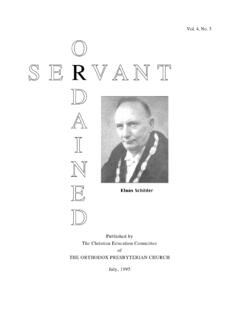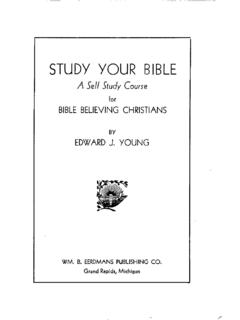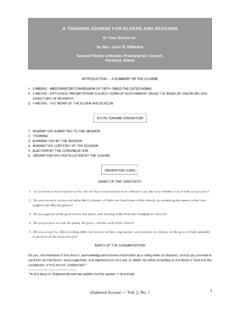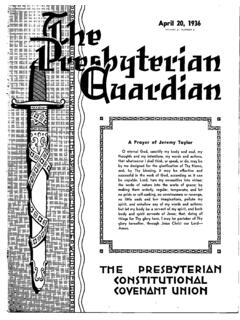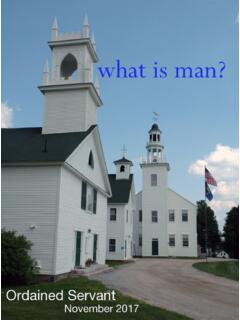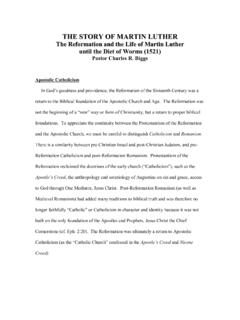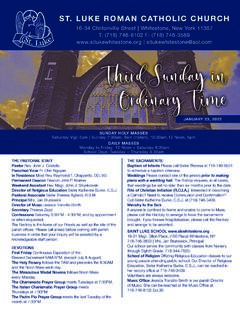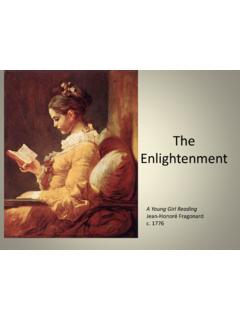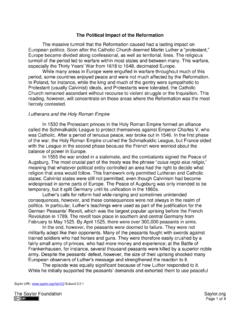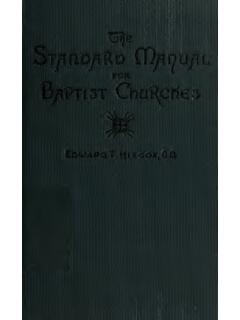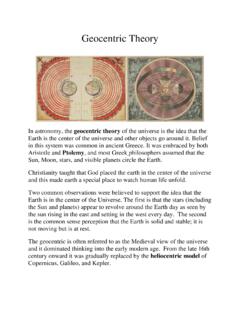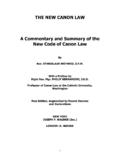Transcription of 'FWECVKQP COQPI VJG 4GHQTOGF
1 Ordained ServantJanuary 2016 Education among the ReformedOrdained Servant Online A Journal for church Officers E- ISSN 1931-7115 CURRENT ISSUE: EDUCATION AMONG THE REFORMED January 2016 From the Editor Ordained Servant now enters its twenty-fifth year of publication. Please pray for its continued faithfulness and usefulness to the officers of Christ s church . Education has been a hot topic among serious Christians for many decades, especially in light of the secularization of American public schools. Historian Darryl Hart explores the variety of ways that Reformed Christians have approached education outside of the visible church .
2 He brings Abraham Kuyper s insights from his famous 1898 Princeton lectures, Lectures on Calvinism, to bear on this important topic. Sherif Gendy brings us another helpful review of a biblical theological theme in Gregory Smith, The Testing of God s Sons: The Refining of Faith as a Biblical Theme. Jeffrey Waddington reviews John Fesko s insightful new book, The Theology of the Westminster Standards: Historical Context and Theological Insights. Paul Helseth reviews two books by Owen Anderson in the Princeton tradition: Reason and Faith at Early Princeton and Reason and Faith in the Theology of Charles Hodge. Helseth is the author of Right Reason and the Princeton Mind: An Unorthodox Proposal (2010).
3 On the subject of preaching I review an important new book by Timothy Keller titled Preaching: Communicating Faith in an Age of Skepticism in which he covers some standard homiletical topics from the perspective of reaching the late modern mind. Finally don t begin the new year without meditating on Christina Rossetti s Old and New Year Ditties 2. Blessings in the Lamb, Gregory edward Reynolds CONTENTS ServantTraining Darryl Hart, Education among the Reformed ServantReading Sherif Gendy, review article on Gregory Smith, The Testing of God s Sons: The Refining of Faith as a Biblical Theme Jeffrey Waddington, review article on John Fesko, The Theology of the Westminster Standards: Historical Context and Theological Insights Paul K.
4 Helseth, Faith and Reason, review of two books by Owen Anderson Gregory Reynolds, review article on Timothy Keller, Preaching: Communicating Faith in an Age of Skepticism ServantPoetry Christina Rossetti, Old and New Year Ditties 2 FROM THE ARCHIVES EDUCATION The Past, Present, and Future Work of Christian Education in the Orthodox Presbyterian church . (Danny E. Olinger) 19 (2010): 46 52. Education, Natural Law, and the Two Kingdoms (Gregory edward Reynolds) 21 (2012): 14 17. _____ Ordained Servant exists to help encourage, inform, and equip church officers for faithful, effective, and God-glorifying ministry in the visible church of the Lord Jesus Christ.
5 Its primary audience is ministers, elders, and deacons of the Orthodox Presbyterian church , as well as interested officers from other Presbyterian and Reformed churches. Through high-quality editorials, articles, and book reviews, we will endeavor to stimulate clear thinking and the consistent practice of historic, confessional Presbyterianism. ServantHistory The Good, the Bad, and the Neutral: Calvinism and the School Question _____ by Darryl G. Hart In 1898 when Abraham Kuyper, a Dutch Reformed minister, institution builder extraordinaire, and soon to be prime minister of the Netherlands, spoke at Princeton Seminary about the virtues of Calvinism, he discussed schools in ways that may have left his listeners scratching their heads.
6 On the one hand, Kuyper complimented his hosts for living in a country where Calvinism was still vigorous. One sign of such health was a common school system which began each day with Bible reading and prayer. Although such tepid religious exercises suggested a decreasing distinctness of Calvinistic convictions, they still reflected the genius of the American founding and its debt to the Pilgrim Fathers who gave the United States, as opposed to the French Revolution, a decidedly Christian character. 1 For those paying careful attention to the series of six lectures, such praise of America s public schools was at odds with Kuyper s remarks about Calvinism and science.
7 In that lecture he contended that educational institutions needed to reflect distinct outlooks. Instead of implementing a common university or school system, as liberal governments in the Netherlands had tried, Kuyper argued for institutional pluralism so that Roman Catholics, Calvinists, and Evolutionists might have their own schools and universities. The idea of one Science only, Kuyper asserted, was artificial and its days were numbered. A better approach was for intellectual endeavor to flourish in .. multiformity. 2 As much as Kuyper and his hosts from the Presbyterian church s original seminary shared in their understanding of Calvinism, the Dutchman s praise for a common educational system in the United States and advocacy of academic institutional diversity in the Netherlands was just one indication of differences between American and European Protestants about education.
8 Those divergences in turn stemmed from political developments that played out differently in Europe and North America after the revolutions of the eighteenth century in the United States and France. What follows is an effort to place Presbyterian and Reformed Protestant ideas about education within a wider historical and cultural context. That larger perspective may well indicate that Calvinists, instead of carving out a distinct and high view of education, were much more dependent on the accidents of history in their approach to education. The heirs of a longer lasting 1 Abraham Kuyper, Lectures on Calvinism (Grand Rapids: Eerdmans, 1931), 14 15.
9 2 Ibid., 141. pattern of church -based and church -sponsored education during the Middle Ages, the Reformers perpetuated schools that made religion central to learning. When civil governments in the modern era of liberal politics took over the responsibilities of universal education, Reformed Protestants had to adjust and they did so largely on terms set by their churches relationship to the national government. The Reformation of Learning For good reason, historians credit the Protestant Reformation with an emphasis on education that had significant consequences for the expansion of formal learning beyond the confines determined by medieval Europe.
10 Prior to the sixteenth century, the Roman Catholic church was largely responsible for education. After the demise of the Roman Empire, the burden for education fell on bishops and religious orders. Cathedral schools and monasteries taught the trivium and quadrivium to young men and boys mainly for the purpose of training future priests. The recovery of Roman and Greek antiquity with the Renaissance provided an alternative model of education, but formal learning remained largely in the hands of the church . The Reformation set into motion a new set of expectations for education. Protestants not only set high standards for a learned ministry but also advocated literacy for the laity so that average Christians could fulfill their obligations for Bible reading, learning catechisms, and worship in the home.
